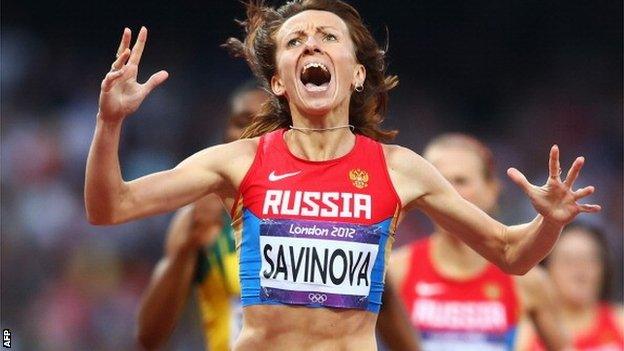Athletics doping scandal: Russia 'fully committed' to change
- Published

Wada says Russia's Mariya Savinova, who won 800m gold at the London Olympics, should be given a lifetime ban
Russia is "fully committed" to the reform needed to comply with anti-doping laws after an athletics scandal.
The country was banned from international competition after a World Anti-Doping Agency (Wada) commission examined claims of widespread doping.
Wada director general David Howman was "pleased" with assurances from Russia's sports minister Vitaly Mutko, but said there was "much work to be done".
Russia faces exclusion from next year's Olympics if not declared compliant.
Howman and Mutko met in Frankfurt, Germany, for the first time since the Russian anti-doping agency (Rusada) was declared non-compliant on 18 November.
A Wada statement said: "During the meeting, minister Mutko committed fully to the process and the changes required of Rusada if they are to achieve compliance status."
Howman added: "Wada is pleased with the assurances provided by Minister Mutko to address the issues raised in Wada's independent commission report.
"There is, however, still much work to be done by Rusada. It is imperative that Russia's anti-doping programme be overhauled in order to protect the rights of clean athletes worldwide and to re-establish public confidence in Russian athletics."
The IAAF, the sport's governing body, is holding a meeting in Monaco on Thursday to determine the measures Russia needs to implement to be reinstated to world athletics.
An inspection team will monitor Russia's federation (Araf) as it bids to regain its IAAF membership.
Araf said it would cooperate "fully and actively with the team".
The IAAF is also awaiting the findings of a report into the conduct of its officials.
That section of the report, likely to be released in January, has been held back after a French police investigation began earlier this month into former IAAF president Lamine Diack and former head of anti-doping Gabriel Dolle.
- Published27 November 2015
- Published27 November 2015
- Published11 December 2015
- Published8 February 2019